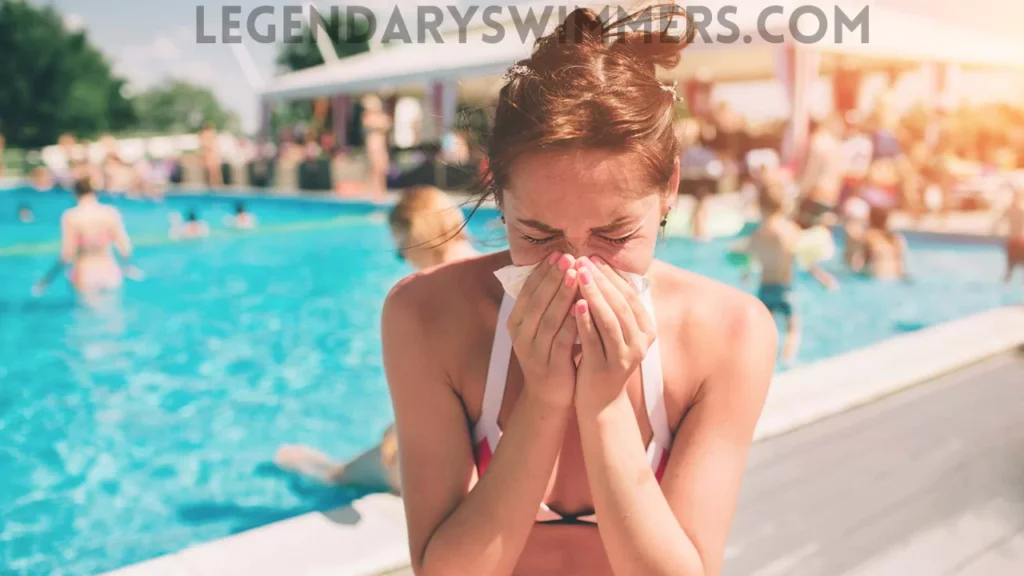| Tip | Description |
|---|---|
| Exhale Through Your Nose | Keep a steady stream of air flowing from your nose while underwater. |
| Use Nasal Sprays | Saline sprays can flush out irritants before and after swimming. |
| Wear a Nose Plug | It is a simple and effective tool to block water from entering your nose. |
| Check Pollen Counts | Avoid high-pollen days when swimming outdoors to reduce allergy risks. |

4 Reasons Why You Get a Stuffy Nose After Swimming
- Updated:
Swimming is one of the best forms of exercise, but for many, it can come with an unwelcome side effect: a stuffy nose. If you’ve ever wondered why your nose gets congested after swimming, you’re not alone! In this article, we’ll dive into the top reasons for post-swim nasal congestion, how you can prevent it, and what to do when symptoms strike.
Water Enters Your Nasal Passages
One of the most common reasons for a stuffy nose after swimming is simple: water enters your nasal passages. This can happen to anyone, regardless of swimming experience, but it’s particularly common during activities like backstroke or diving. Water entering your nose can irritate the sensitive lining, leading to inflammation and congestion.
Why Does This Happen?
- Anatomy of the Nose: The nasal passages are lined with mucous membranes that react to irritants, including water. When water enters, the membranes swell to protect your body. According to a study published in Otolaryngology Research and Reviews, over 65% of swimmers report mild to severe nasal irritation after extended pool sessions due to water exposure. [Source]
-
Swimming Techniques
Improper breathing techniques can make it more likely for water to get in. Dr. Thomas K. Burns, a sports medicine specialist, suggests that “exhaling through your nose while underwater is key to preventing water from entering the nasal cavity. This creates a protective airflow barrier.”
Pro Advice:
- According to the U.S. Masters Swimming organization, exhaling through your nose while underwater can significantly reduce the chances of water entering your nasal passages. A steady exhalation creates a barrier that keeps water out.
- A study conducted by the University of Maryland found that swimmers who consistently practiced nasal exhalation experienced 45% fewer instances of nasal irritation compared to those who did not.
Allergies to Pool Chemicals or Natural Elements
Allergies are another major cause of post-swim nasal congestion. Whether you’re swimming in a chlorinated pool or a natural body of water, allergens can irritate your sinuses.
Chlorine Sensitivity
Chlorine, used to keep pools clean, can irritate sensitive nasal tissues. While not everyone is allergic to chlorine, those with pre-existing respiratory conditions may experience congestion, sneezing, and even watery eyes after swimming.
The American College of Allergy, Asthma & Immunology (ACAAI) notes that chlorinated water can strip the nasal lining of its protective mucus, leaving it more susceptible to irritation and swelling.
Outdoor Allergies
If you’re swimming outdoors, seasonal allergens like pollen and grass may be to blame. These particles can settle on the water’s surface, entering your nose while you swim.
How to Identify Allergies
- Symptoms include sneezing, itchy nose, or red eyes.
- Chlorine-related issues are more likely if symptoms occur only after pool swims, not ocean swims.
Sinus Irritation or Infection (Sinusitis)
Swimming can sometimes lead to sinusitis, an inflammation of the sinuses caused by water entering the nasal cavity and becoming trapped. The pressure changes associated with diving or swimming underwater can exacerbate this condition.
What Is Sinusitis?
Sinusitis is an infection or inflammation of the sinuses, often caused by bacteria, viruses, or fungi. It’s more likely to occur if you already have a cold or allergies.
Symptoms of Sinusitis After Swimming
- Stuffy nose
- Headaches
- Facial pain
- Post-nasal drip
Prevention Tips
- Use a nasal spray before and after swimming to flush out irritants.
- Avoid swimming when you have a cold or pre-existing nasal congestion.
Swimming Technique and Environmental Factors
Your swimming technique and the environment where you swim can also contribute to nasal congestion. For instance:
Improper Breathing Techniques
Failing to exhale properly while swimming can allow water to enter the nose, leading to irritation and inflammation.
Temperature and Humidity
Swimming in cold or highly humid environments can cause the nasal membranes to swell, leading to congestion.
Tips to Improve Your Technique
- Practice consistent exhalation through your nose.
- Use a nose plug to prevent water from entering.
How to Prevent and Treat a Stuffy Nose After Swimming
Here are some effective strategies to prevent and treat nasal congestion:
Prevention
Treatment
| Tip | Description |
|---|---|
| Blow Your Nose | Clear out any trapped water after swimming. |
| Steam Inhalation | Inhaling steam can soothe irritated nasal passages and reduce swelling. |
| Stay Hydrated | Drinking water helps thin mucus, making it easier to drain. |
| Consult a Doctor | Persistent congestion may require professional treatment, especially for sinusitis. |
Looking to Improve Your Swimming Skills?
Swimming is a joyful and healthy activity, and you shouldn’t let a stuffy nose hold you back! Looking for the perfect Christmas gift?
Give the gift of confidence and health with swimming lessons at Legendary Swimmers Academy, where you can access professional swimming lessons, and advanced training programs. Whether you’re a beginner looking to refine your strokes or an experienced swimmer aiming to compete professionally, our expert coaches are here to guide you every step of the way. We understand the challenges swimmers face, from technique to overcoming physical discomforts like nasal congestion. Our customized programs are designed to help you swim with confidence and efficiency, ensuring you enjoy every session without any barriers about how we can help you elevate your swimming experience to the next level.
Frequently Asked Questions
Q: Why does my nose get stuffy after swimming in a pool?
A: Chlorine or other pool chemicals can irritate your nasal passages, leading to congestion. Additionally, water entering your nose can also cause irritation.
Q: Can allergies cause a stuffy nose after swimming?
A: Yes, outdoor allergens like pollen and grass can cause congestion, especially if you’re swimming in a natural body of water.
Q: How can I prevent water from entering my nose while swimming?
A: Exhale through your nose while underwater, and consider using a nose plug for added protection.
Q: Is sinusitis common among swimmers?
A: Sinusitis can occur if water becomes trapped in your nasal passages. Using preventive measures like nasal sprays can help reduce this risk.
Q: What products can help reduce nasal congestion after swimming?
A: Nasal sprays, saline rinses, and nose plugs are effective tools to prevent and treat nasal congestion.
References

Natasha Nicole Leyva
Hi, I’m Natasha—swimmer, coach, and aquatic fitness enthusiast. My journey began in New Zealand after a professor recommended swimming to help with a knee injury. The low-impact nature of swimming worked wonders, and it quickly became my favorite form of exercise. This passion grew into a thriving swim academy, and soon, requests for aquatic fitness classes started pouring in. After becoming certified, I realized how powerful water workouts could be for recovery and fitness. Now, I share my expertise here to help others experience the benefits of aquatic movement—whether for recovery, fitness, or fun!






